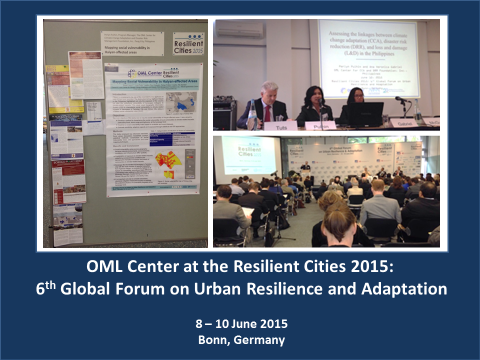OML Center at the Resilient Cities 2015: 6th Global Forum on Urban Resilience and Adaptation

Poster: Mapping Social Vulnerability in Haiyan-affected Areas
December 11, 2016
Scientists Analyze Changes in Climate Extremes in Global Urban Areas
December 11, 2016OML Center at the Resilient Cities 2015: 6th Global Forum on Urban Resilience and Adaptation

By AV Gabriel and P Pulhin
Date posted: June 16, 2015
The OML Center presented and participated in the Resilient Cities 2015: 6th Global Forum on Urban Resilience and Adaptation held on June 8 – 10 in Bonn, Germany.
A poster presentation on “Mapping Social Vulnerability in Haiyan-affected Areas” was delivered by OML Center Program Manager Perlyn Pulhin. The poster is about a study that uses Geographic Information System (GIS) to characterize social vulnerability to climate-related hazards of barangays of Tacloban City and Ormoc City using a modified social vulnerability index (SoVi).
Aside from the poster presentation, Pulhin and Research Assistant Ana Veronica Gabriel presented in a panel session entitled “Beyond Adaptation: The Reality of Loss and Damage for Cities.” The presentation given by Pulhin and Gabriel is entitled “Assessing the linkages between climate change adaptation (CCA), disaster risk reduction (DRR), and loss and damage in the Philippines.” The presentation revealed initial results of the study. The study is one of the outputs of the Asia-Pacific Network for Global Change Research (APN) – funded regional project called “Assessing the linkages between CCA, DRR, and L&D: Case studies on the low-lying coastal cities in Cambodia, Indonesia, Philippines, Thailand, and Vietnam” that is currently being implemented and lead by the Center.
About Resilient Cities 2015
The Global Forum brought together more than 420 participants from 56 different countries and regional authorities all over the world. 170 of them participated as speakers through plenaries, presentations, workshops, and training sessions. The sessions revolved around these nine themes: 1) Resilient urban food systems; 2) Financing resilience planning and development; 3) Adaptation planning and integrated approaches; 4) Capacity building, governance and collaboration; 5) Resilient buildings, design and infrastructure; 6) Ecosystem-based adaptation; 7) Resilient Public health systems; 8) Data for local resilience; and 9) Communicating resilience.
The Resilient Cities is an annual global forum on urban resilience and adaptation hosted every year in Bonn. Its main goal is to connect local government leaders and climate change adaptation experts to discuss adaptation challenges facing urban environments around the globe and forge partnerships that could have lasting impacts for cities.
Participants of the Resilient Cities 2015 were able to: 1) Interact with authoritative experts and the audience to build bridges across the public and private sectors and fields of expertise; 2) Learn about groundbreaking topics; 3) Gain practical knowledge with the Resilient Cities practical case studies, such as the Reality Check Workshops; and 4) Start new contacts and develop new partnerships at the congress venue, an ideal location that fosters networking opportunities. Since diversity of thoughts and approaches is at the very core of the Resilient Cities congresses, various issues emerged at the 2015 Forum that link with important post-2015 processes such as the: Sendai Framework for DRR, Financing for Development; Sustainable Development Goal (SDG)s and an Urban (SDG); 21st Conference of the Parties; and Habitat III in 2016. The Forum was set to coincide with the United Nations Framework Convention on Climate Change (UNFCCC) Negotiation Meetings so that participants of the UNFCCC events can attend and contribute in the discussion of the Resilient Cities 2015.
Take-away Message
As Heather McGray, Director, Vulnerability and Adaptation Initiative, World Resources Institute noted at the Closing Session of the Forum: “All different Paris outcome scenarios are still on the table, good and bad. We hope that the actual outcome will mean that cities can finally allocate more of our energy to real on-the-ground action, but this is far from certain. All city representatives should therefore now go back home and persuade your national governments to act.” There are still a lot of challenges that came out of the Forum’s discussions including finance and knowledge gaps. As a follow-through to Director McGray’s message of moving towards real actions on the ground, we should do whatever it takes to generate transformative change by enhancing our respective roles whether as knowledge providers, communicators, urban planners, policy-makers, financer, implementer and the list goes on.
According to the Mayor of Bonn, Jurgen Nimptsch, “Cities and climate change, cities and resilience…it’s about saving lives.” Let us ensure that our local actions for sustainability can lead to resilience and responsive strategies to address the interlinked challenges globally and locally. After all, these actions will eventually benefit humanity and we are part of it.
To view the poster, click here.
To view the panel presentation, click here.
To know more about the Resilient Cities 2015, click here.
